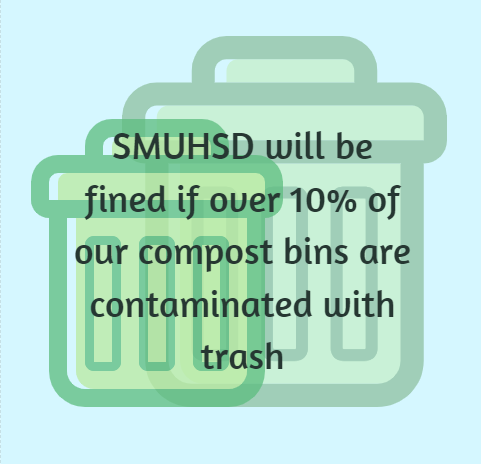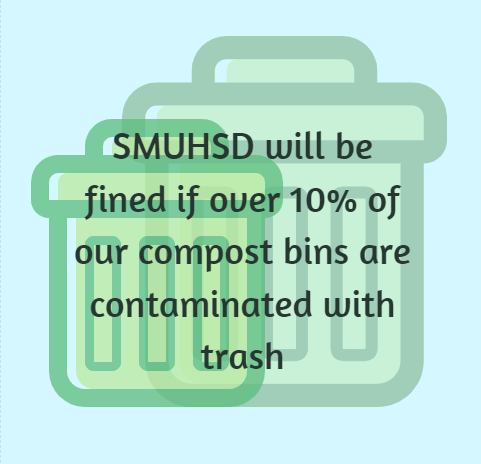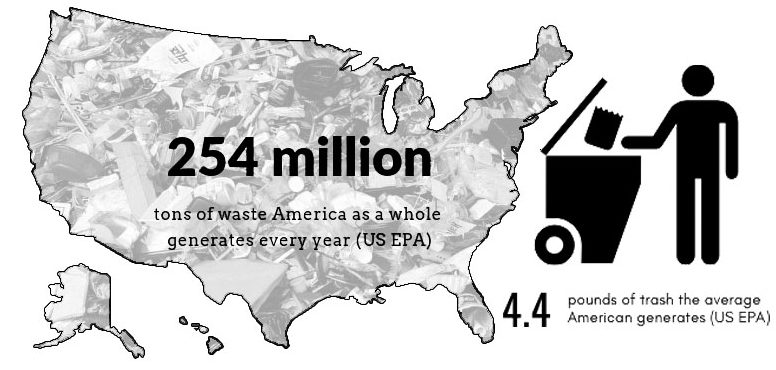

Aragon, along with all the other schools in the San Mateo Union High School District, adopted a new composting policy at the end of January. Each school received green compost bins similar to the blue recycling bins already in place at Aragon for the purpose of furthering sustainability at high schools in California.
According to the U.S. Environmental Protection Agency data archives, the average American generates 4.4 pounds trash each and every day, and America as a whole generates upwards of 254 million tons of waste every year. However, Americans only create about 1.5 pounds of recyclable or compostable waste every day. So why the discrepancy? Junior Michael Ko attributes it to a matter of convenience.
“I don’t think of dividing my trash on a day-to-day basis,” Ko said. “Even when I’m going to throw something away, there aren’t many options for trash sorting.”
Because of the large numbers of students at SMUHSD high schools and the lack of disposal options and enforcement of trash division policies, the trash bins have been overflowing with all kinds of waste: recyclable, compostable and non-reusable.
This will change with the new composting policies of the district. The new policies are due, in part, to California Legislation Bill AB-1826, lobbied for by the California Department of Resources Recycling and Recovery.
The bill helps make businesses across California more conscious of their waste disposal and “require[s] a business that generates 4 cubic yards or more of commercial solid waste per week, on and after January 1, 2019, to arrange for organic waste recycling service.”
School Board Director of Maintenance, Operations and Facilities Linda Carlton stated that the new policy will be implemented quickly at all schools in the SMUHSD district.
“Each campus [has been] provided green bins, located in appropriate areas, for organic food waste and food-soiled paper waste,” Carlton said. “The green bins are labeled showing what items may be deposited into the bins. We ask that students and staff discard their organic food waste and food-soiled paper waste into these bins.”
However, implementation may become an issue. Ko notes that at Aragon, even with the large blue recycling bins and excess of trash cans around campus, students still disregard the categories.
“To be honest I don’t really think people would care,” Ko said. “They added new recycling bins, but I still see a lot of trash in the recycling. The school isn’t super strict with regulating that.”
This ineffective regulation of the trash policy may have to change at schools with regards to the new compost bins, as AB-1826 is a state-wide bill that affects all businesses. There will be consequences for districts that dispose in the incorrect bins.

“Oversight needs to be at the school level, with students and staff using the correct bins,” Carlton said. “We cannot have more than 10 percent of our bins ‘contaminated’ or SMUHSD will be fined.”
In addition to an economic issue for the school, the lack of purposeful waste disposal may also have many environmental impacts if not addressed quickly. According to biology and AP
Environmental Science teacher Jessica Valera, trash can lead to a myriad of problems; the eventual buildup of human-produced waste will negatively affect our environment.
“The thing to remember is that there is no ‘away’ when you throw something away,” Valera said. “Everything stays here on earth with us … Many people don’t realize that when organic waste … ends up in landfills, the anaerobic process by which it decomposes produces methane, which is a greenhouse gas.”
Valera has implemented a worm composting bin in her class, both to reduce her own food waste and also to teach her students about the benefits composting, more specifically, worm composting, has on the world around them. This, Valera believes, will be one of the first steps to firmly and effectively implement composting everywhere.
“Everyone needs to know what types of things can go in each bin and understand the impacts when organic waste goes to landfill instead of to compost,” Valera said. “Once people understand how serious the situation is and that we have tremendous power to reduce our impact and the amount of waste going to landfill, I don’t think there will be any enforcement – people will want to do the right thing.”




